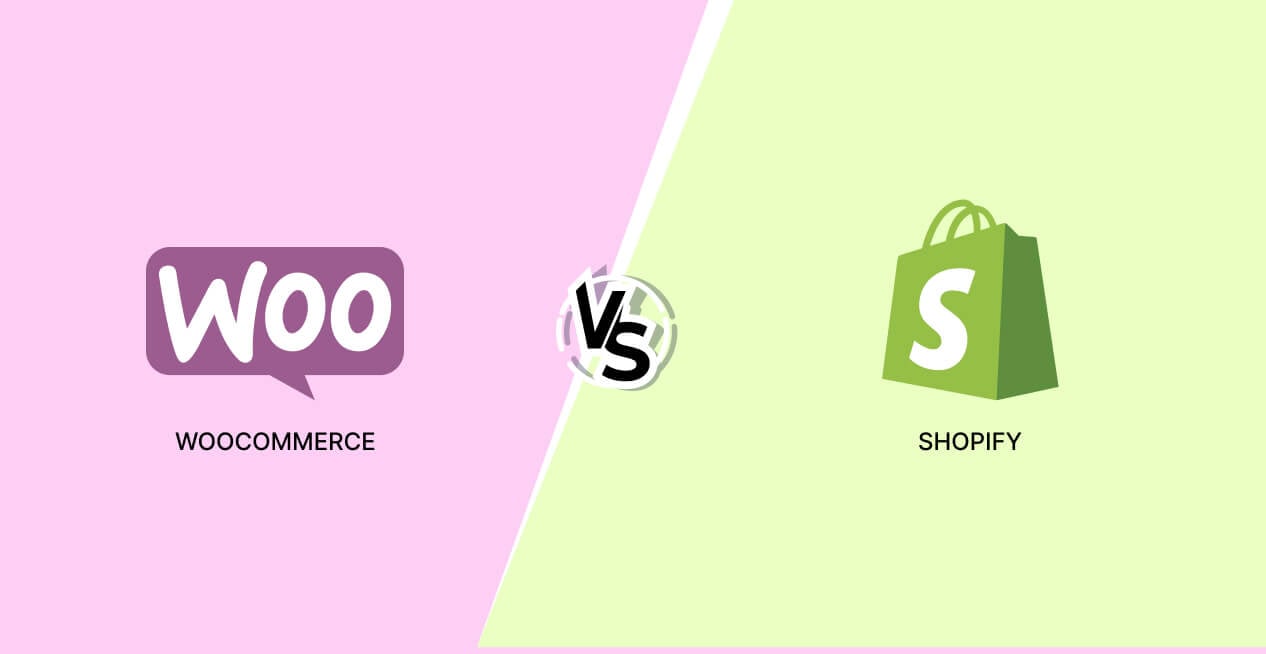Introduction
The eCommerce landscape is booming, making it crucial for entrepreneurs and business owners to choose the right platform for their online stores. A user-friendly and efficient eCommerce platform can simplify inventory management, payment processing, and overall shopping experience.
WooCommerce and Shopify are two leading options that cater to businesses of all sizes. In this blog post, we’ll compare these popular platforms, discussing their pros and cons, to help you decide which one aligns with your specific needs and goals. Let’s explore which platform can elevate your eCommerce store to the next level.
WooCommerce
WooCommerce is a widely-used, open-source eCommerce plugin designed for businesses operating on WordPress. Known for its customizability and flexibility, it enables store owners to craft unique online shopping experiences for their customers.
Pros of using WooCommerce
- Extensive customization and control due to its open-source nature, allowing for tailored store design and functionality
- Seamless integration with WordPress, making it perfect for existing WordPress users or those planning to use the platform
- Large plugin ecosystem for added functionality, including marketing, payment gateways, and shipping options
- No platform fees, making it an affordable option for startups and small businesses
- Ownership of your store data, giving you full control over customer information and store analytics
Cons of using WooCommerce
- Requires more technical expertise for setup and maintenance, which may not be ideal for those without coding or web development experience.
- Additional costs for hosting, security, and premium plugins can accumulate, making it potentially expensive in the long run.
- Can be time-consuming to manage compared to other platforms, as it requires frequent updates and maintenance.
- Limited official customer support, with users often relying on community forums and third-party developers for assistance.
- Scalability can be challenging, as increased traffic or large product catalogs may require more advanced hosting solutions and optimization.
Shopify
Shopify is a comprehensive, hosted eCommerce solution that has gained popularity for its user-friendly interface and quick setup process. Designed to cater to a variety of businesses, it simplifies store management and offers a range of built-in tools and features.
Pros of using Shopify
- Easy setup and user-friendly interface for beginners, requiring no technical expertise to launch a store
- Inclusive hosting and security measures, ensuring your store is fast, secure, and reliable
- Wide range of themes and integrations for customization, offering a visually appealing and functional store
- 24/7 customer support for assistance through chat, email, and phone, providing timely help when needed
- Scalability made easy, with the ability to handle increased traffic and product catalogs as your business grows
Cons of using Shopify
- Limited customization options compared to open-source platforms like WooCommerce, which can restrict unique store design and functionality
- Monthly fees and transaction costs, which can be expensive for small businesses or those with tight budgets
- Potential challenges when migrating to other platforms, as Shopify uses a proprietary coding language called Liquid
- Restricted control over store data, as Shopify stores and manages customer information and store analytics on its platform
- Some popular third-party payment gateways can incur additional transaction fees, increasing operational costs
WooCommerce vs Shopify- A direct comparison
Ease of use
WooCommerce: Requires technical expertise and familiarity with WordPress; steeper learning curve; managing updates and maintenance might be time-consuming.
Shopify: User-friendly interface, simple setup process ideal for beginners; intuitive store management with minimal technical knowledge needed.
Customization
WooCommerce: Extensive customization options due to open-source nature; large plugin ecosystem; full control over store design and functionality.
Shopify: Limited customization compared to WooCommerce; offers a variety of themes and third-party integrations for store appearance and features; uses a proprietary coding language, Liquid.
Pricing and costs
WooCommerce: No platform fees, additional costs for hosting, security, and premium plugins; potential long-term expenses; affordable option for startups and small businesses.
Shopify: Monthly fees and transaction costs; includes hosting, SSL, and security measures; can be expensive for small businesses or those on tight budgets.
Support and community
WooCommerce: Large community for support; limited official customer support; relies on forums, third-party developers, and extensive documentation.
Shopify: 24/7 customer support via chat, email, and phone; active user community for additional guidance; resources such as tutorials and documentation readily available.
Scalability
WooCommerce: Scalability can be challenging; increased traffic or large product catalogs may require advanced hosting solutions and optimization; more hands-on management is needed.
Shopify: Easy scalability; designed to handle increased traffic and product catalogs as your business grows; hosting and performance improvements managed by the platform.

WooCommerce or Shopify- The right choice for your business
Choosing the ideal eCommerce platform for your store is a critical decision that can significantly impact your business’s success. Both WooCommerce and Shopify have their unique advantages and drawbacks, so the best choice ultimately depends on your specific needs, technical expertise, and budget.
WooCommerce offers extensive customization options, a large plugin ecosystem, and seamless integration with WordPress. However, it requires more technical knowledge and involves additional costs for hosting, security, and plugins. If you have experience with WordPress or desire a high level of control over your store, WooCommerce might be the better option for you.
On the other hand, Shopify provides a user-friendly interface, easy setup, and 24/7 customer support. It includes hosting and security measures but has limited customization options and monthly fees. If you’re a beginner or prefer a more streamlined approach to manage your online store, Shopify could be the ideal choice.
By carefully evaluating your specific requirements and goals, you can select the platform that will best support your eCommerce store’s growth and success.
FAQs
Which is better: WooCommerce or Shopify?
The choice between WooCommerce and Shopify depends on your specific needs, technical expertise, and budget. WooCommerce offers extensive customization, seamless integration with WordPress, and no platform fees, but requires more technical knowledge. Shopify provides a user-friendly interface, easy setup, and 24/7 customer support, but has limited customization options and monthly fees. Carefully consider your requirements and goals to determine the best platform for your eCommerce store.
Who has better apps?
Both WooCommerce and Shopify offer a wide range of apps and plugins to extend your store’s functionality. WooCommerce boasts a large plugin ecosystem, including many free and premium options. Shopify has a robust app store with both free and paid apps. While both platforms offer quality apps, WooCommerce tends to offer more customization due to its open-source nature.
Which platform is more scalable, WooCommerce or Shopify?
Shopify is generally considered more scalable than WooCommerce. Shopify is designed to handle increased traffic and product catalogs as your business grows, with hosting and performance improvements managed by the platform. WooCommerce’s scalability can be challenging, requiring advanced hosting solutions, optimization, and more hands-on management as your store grows.
Can you use WooCommerce or Shopify for free?
WooCommerce is a free, open-source plugin that you can use without platform fees. However, there are additional costs for hosting, security, and premium plugins. Shopify is not free and requires a monthly subscription, with multiple pricing plans available to suit different business needs.
Do you have to pay for hosting with WooCommerce or Shopify?
With WooCommerce, you are responsible for securing your own hosting, which can incur additional costs. Since WooCommerce is a plugin for WordPress, hosting is not included. Shopify, on the other hand, is a hosted solution that includes hosting, SSL, and security measures in its monthly subscription fees, so you don’t need to worry about finding separate hosting.









